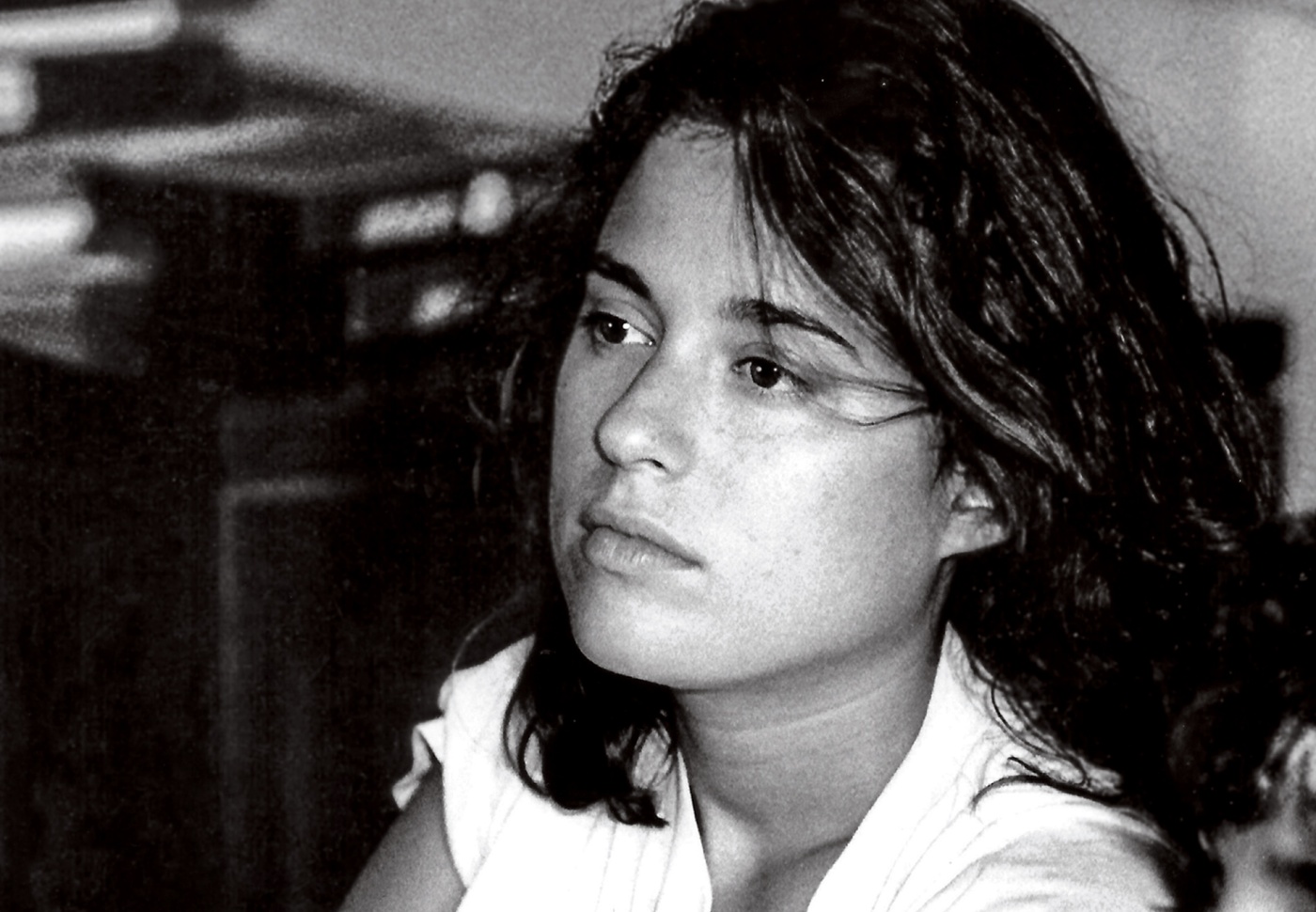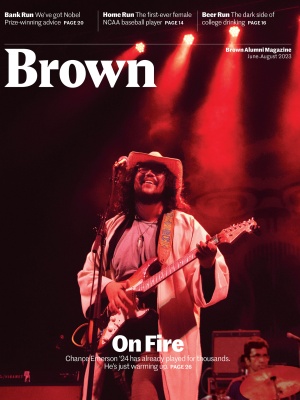That Girl
Unknowingly, a young alum threw a lifeline to a trauma survivor. A 40-year friendship ensued.
Our story began in Brown’s Admissions Office, fall 1983. I was a high school senior; Kit Boss ’83, in his first post-college job, was my interviewer.
I was confident as we talked about our shared love of writing, the orange minibus I drove all over D.C., and why I had transferred high schools. Even I’m impressed by that girl. Kit was too.
It was the last time in my life I could joke and verbally spar without fear of suddenly being overcome by dizziness, nausea, pain, and many other symptoms that made lighthearted chitchat impossible.
What happened to me?
Pretty much everything, before I hit ten. On the daily I was kicked, hit, slapped, punched, spit on, sat on, smothered, dragged across the floor until I got rug burn, “wrestled,” lied to. I was publicly shamed, excluded, laughed at, derided. Hit with hangers and bike locks. Molested. Forced to play strip poker. Forced to look at porn. I had darts thrown at me. My head held underwater. I was choked, “tickled,” tackled. Hair pulled. A knife stabbed into a door next to my head. The bathroom door lock picked as I frantically jumped on top of the closed toilet in a futile effort to hide as my tormentor yelled death threats from the hall.
When I was 8, my two older brothers screamed that Dad was dead; he lay unmoving on his bedroom floor. By the time I’d lost my mind, he sat up laughing.
At 12, I was punched in the face hard enough to make the Chris Rock slap seem like a love tap. Twenty years later, the harm from that one assault led a neurologist to liken my injury to untreatable epilepsy.
At 14, I was drugged with hash.
I could go on and on and on.
By the time I met Kit, just before I applied Early Decision to Brown, I presented well, but inside I was barely alive. And so I was disappointed but by no means shocked when I was deferred.

Then, December 26th, a card and handwritten letter arrived—from Kit.
Seasons Greetings, Betsy!
Alright, so you didn’t get into Brown on your first crack. And you’re probably sorta bummed. But stop being so egocentric for a second and think about others—those who got rejected outright; the ones who got in but who’ll go to Harvard; and me.
Yes, Betsy, think about me. I planned on being able to write you and say “Congratulations on getting accepted, blah blah blah...” But now I have to try to encourage you without getting your hopes too high.
Let me tell you what sorta pisses me off (this is all very hush-hush, of course).
Can you imagine getting this letter from your college interviewer? Me, either. I was gobsmacked.
You know those poems you wrote? I sent them, along with my glowing (it was actually radiating this holy light) interview write-up, to be filed with your application. But down in the foul room, sorry, file room, someone figured Betsy Block and Elizabeth Block were two different people, so your poems and my report never made it to your other folder.
After I found out you were held over, I went downstairs and righted all wrongs. If this stuff had been in your folder in the first place, it might have made the difference. Be of good cheer, and know that if you don’t get in there’s someone (me), besides your parents and your grandmother, who’s going to be just as bummed as you.
I don’t know why he did this. He says he sincerely believed the Brown class of 1988 would be better off with me in it.
I understand now that trauma made me appear extremely autonomous, polished, and mature.
Until Kit, when I was seen, it was almost always to be abused or pursued. Suddenly, here was this guy who, unlike so many men, couldn’t have had any ulterior motives because we lived so far apart.
He’d seen me and was on my side. He wanted to help, not harm. This still soothes my nervous system 40 years later.
It’s also true he may have had a little crush on me and, after getting his first letter, maybe I had a small one on him, too. Life is never straightforward.
On May 10, 1984, another letter arrived:
Congratulations!
Kit’s intervention had made the difference. I got into Brown!
I was so pleased to hear that Brown admitted someone as deserving as you. Don’t spend your summer wondering “who got you in” to Brown: It wasn’t your father unless he’s rich enough to give Brown a building or two—and it certainly wasn’t lil ol’ me. It was you, you crazy kid.
We kept up our correspondence for a couple of years. By the time I got to College Hill, Kit had moved to England; the dates on his letters had acquired a British accent.
7 April, 1985
Betsy,
You must be special because I’m sending you a postcard with a 22-cent stamp. You think I can afford that? What am I, heir to the Bromo-Seltzer fortune?
My internship ends April 19 and shortly thereafter I plan to get in my car and progress in a northeasterly direction, stopping in Durham, NYC, Boston, and oh yes, Providence. Maybe we could arrange to have a beer or some ginseng tea seeing as how you’re underage in Little Rhody.
I remember getting this card and thinking: Uh-oh.
A year and a half earlier, Kit had met me at my alluring peak. Now my hair was stringy, eyes shadowed. I had put on the expected Freshman Fifteen plus five more for extra credit. I was deep in the throes of post traumatic stress, dangerously lost in the chaos that had rooted itself in my brain. For some reason, I said yes to coffee anyway.
When I was age 10, “on vacation” with my mother and brother, my brother got a pool full of kids we’d never met to scream that I was fat until I fled the area. Mom, as usual, did nothing.
Of all I endured during those first 15 years of my life, the worst part was feeling profoundly alone, flawed, and unlovable. Kit had been an antidote to a childhood full of pools.
At that hour-long coffee on College Hill, we didn’t click. I knew I would never talk to Kit again. I had already been through so much; this was just one more loss.
Except it wasn’t. Ten years after that fateful date, I thought of Kit and looked him up. During the years we’d lost contact, my former interviewer had become a successful TV comedy writer. My heart soared and sank, both. While he was winning Emmy awards and succeeding at one of my dreams, I had been freelance food writing, sure, but mostly contending with life-altering health problems while putting nearly all my intelligence, energy, and time into learning how to parent.
Kit agreed to a phone call during which I told him I, too, hoped to get into comedy writing.
Would I be willing to move to LA or NYC? My family was rooted in Boston; how could I? (I didn’t mention chronic petit mal seizures, systemic pain, dizziness, all of which made a job impossible. Trauma is so isolating. It also comes with crushing shame.) Kit did what he could, which this time wasn’t much. He wished me luck and put me on his Christmas card list.
Every time I got a card from him, I felt a little pang of happiness that he thought of me, and also sorrow for the dreams I might have had for myself in a different life.
It wasn’t until I was 45, unable to eat, sleep, or function in the year after my mother’s death, that I could accept that I had c-PTSI. (The “c,” for those who aren’t familiar with the language of trauma, refers to chronic, as in years of trauma, not one event. And I recently started saying “I” for injury rather than “D” for disorder, a far more accurate descriptor of my condition.)
In December 2020, I got Kit’s holiday email, this time having finally received extensive trauma treatment and physical rehab. I emailed him back, trying to strike up a conversation. He responded. Two years later, Kit and I are friends.
In one version of my life story, I’ve missed out on so much owing to assaults of all kinds during my childhood.
In this edition, I guess I’m still glad I went to Brown, even though, when I get emails from the alumni office asking if I will be a mentor, part of me shrinks because I myself need a mentor. It reminds me of all the friends I never made. The clubs I never joined. The creative projects I never undertook. Never feeling like I belonged, there or anywhere (except with my own husband, kids and friends, thank God).
Out in the world, I have always felt like that girl at the pool.
But while that is all true, here’s another version of my life that’s also true:
My husband and I recently celebrated our 30th anniversary. I am close to my two adult kids, who are my everything. I have many friends, a peaceful home, and an abundance of love and laughter in my life. Lately I’ve been well enough to write, and volunteer, and wonder about the future.
I have almost completed what I believe has been my life’s main mission—healing inherited trauma—and I am still relatively young, or at least not old. Who knows what could happen next, this time not to me, but for me?
This thought is a newborn shoot. I am tending it carefully every day.
Nearly four decades ago, a stranger showed me it’s safe to come out of hiding.
Here I am.
Having spent 40 years healing from extensive childhood trauma, Betsy is profoundly grateful to be well. The freelance food writer and author of The Dinner Diaries (Algonquin, 2008) is now launching a YouTube cooking show about vegetables, Just Veggin’. For more info about Betsy and her latest projects, go to Betsyblock.com or jveggin.com.





